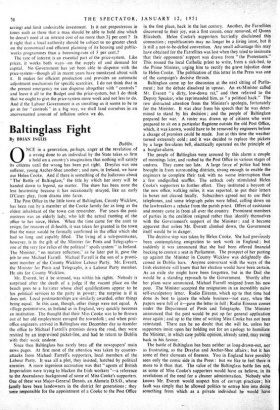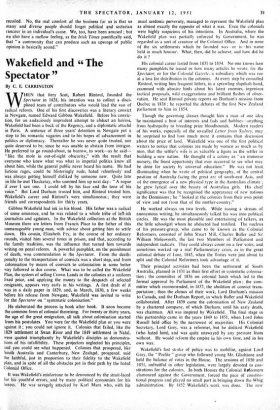Baltinglass Fight
By BRIAN INGLIS Dublin.
ONCE in a generation, perhaps, anger at the revelation of a wrong done to an individual by the State takes so firm a hold on a country's imagination that nothing will satisfy its citizens until the wrong has been put right. Dreyfus was one sufferer, young Archer-Shee another ; and now, in Ireland, we have
our Helen Cooke. And if there is something of the ludicrous about " The Battle of Baltinglass," the title by which her story will be handed down to legend, no matter. The show has been none the less heartening because it has occasionally strayed, like an early O'Casey play, from drama into farce. The Post Office in the little town of Baltinglass, County Wicklow, has been run by a member of the Cooke family for as long as the oldest inhabitant of the town can remember. For years the post- mistress was an elderly lady, who left the actual running of the office to her niece, Helen. When the time came for the aunt to resign, for reasons of ill-health, it was taken for granted in the town that the niece would be formally confirmed in the office which she had so long and capably filled. The living of a sub-postmaster,
however, is in the gift of the Minister for Posts and Telegraphs—
one of the %Try few relics of the political "spoils system " in Ireland. The Minister, "on mature reflection," as he later put it, gave the job to one Michael Farrell. Michael Farrell is the son of a promi- nent member of the County Wicklow. Labour Party. Mr. Everett, the Minister for Posts and Telegraphs, is a Labour Party member. He sits for County Wicklow.
Mr. Everett, let it be stressed, was within his rights. Nobody is surprised after the death of a judge if the vacant place on the bench goes to a barrister whose chief qualifications appear to be his political services to the party in power ; the surprise is if it does not. Local postmasterships are similarly awarded, other things being equal. In this case, though, other things were not equal. A village postmistress. in Ireland as in England, very quickly becomes an institution. The thought that their Miss Cooke was to be thrown out of her old employment enraged the townsfolk ; and when post- office engineers arrived in Baltinglass one December day to .transfer the office to Michael Farrell's premises down the road, they were resisted by an improvised picket-line, and had to return to Dublin with their work undone.
Since then Baltinglass has rarely been off the newspapers' main news pages. At first most of the attention was taken by counter- attacks from Michael Farrell's supporters, local members of the Labour Party. It was all a plot, they insisted, hatched by political enemies. A more ingenious accusation was that "agents of British Imperialism were trying to blacken the Irish workers "—a reference to the Ascendancy background of some of Miss Cooke's supporters. One of these was Major-General Dennis, an Alamein D.S.O., whose family have been landowners in the district for generations ; they were responsible for the appointment of a Cooke to the Post Office in the first place, back in the last century. Another, the Farrellites discovered to their joy, was a first cousin, once removed, of Queen Elizabeth. Helen Cooke's supporters hurriedly disclaimed this Connection; republicanism may no longer be a living issue, but it is still a not-to-bc-defied convention. Any small advantage this may have obtained for the Farrellites was lost when they tried to insinuate that their opponents' support was drawn from "the Protestants." This roused the local Catholic priest to write, from a sick-bed, to the Prime Minister, urging him to rectify the grave injustice done to Helen Cooke. The publication of this letter in the Press was one of the campaign's decisive thrusts.
Baltinglass came up for discussion at the next sitting of Parlia- ment; but the debate dissolved in uproar. An ex-Minister called Mr. Everett "a dirty, low-down rat," and then referred to the Deputy Speaker, who reprimanded him, as "a political hack." The row distracted attention from the Minister's apologia, fortunately for the Minister. It was clear from his speech that he was deter- mined to stand by his decision ; and the people of Baltinglass prepared for war. A roster was drawn up of citizens who were prepared to sit on a particular flagstone outside the old Post Office, which, it was known, would have to be removed by engineers before a change of premises could be made. Just at this time the weather turned extremely cold ; and it was decided to replace the pickets by a large fire-alarm bell, electrically operated on the principle of a burglar-alarm.
The people of Baltinglass were aroused by this alarm a couple of mornings later, and rushed to the Post Office in various stages of undress. They came too late. A large force of police had been brought in from surrounding districts, strong enough to enable the engineers to complete their task with no worse interruption than a few undignified scuffles. The setback only stimulated Helen Cooke's supporters to further effort. They instituted a boycott of the new office, walking miles, it was reported, to put their letters in boxes not cleared locally. Subscribers agreed not to use their telephones, and some telegraph poles were felled, calling down on the lawbreakers a rebuke from the parish priest. Offers of assistance and money came in from all over the country. Prominent members of parties in the coalition resigned rather than identify themselves with the Government's support of the Minister: and it became apparent that unless Mr. Everett climbed down, the Government itself would be in danger. The decisive step was taken by Helen Cooke. She had previously been contemplating emigration to seek work in England ; but suddenly it was announced that she had been offered financial backing to contest a seat in Parliament. The prospect of her putting up against the Minister in County Wicklow was delightedly dis- cussed in Dublin bars. Anyone conversant with the ways of the Irish electorate will know that her election would have been certain. As an exile she might have been forgotten, but in the Dail she would be a standing reproach to the Government. Shortly after her plans were announced, Michael Farrell resigned from his new post. The Minister accepted the resignation in an incredibly naive self-exculpatory letter. Radio Eireann, which up to that time had done its best to ignore the whole business—not easy, when the papers were full of it—gave the letter in full ; Radio Eireann comes under the Department of Posts and Telegraphs. The Minister announced that the post would be put up for general application
once again ; and up to the time of writing Miss Cooke has not been reinstated. There can be no doubt that she will be, unless her supporters insist upon her holding out for an apology to humiliate the Minister, in which case public opinion, already sated, may swing back in his favour.
The battle of Baltinglass has been neither as long-drawn-out, nor as frustrating, as the Dreyfus and Archer-Shee affairs ; but it has some of their elements of fineness. You in England have possibly seen only the comic side in the Press : but we like to feel there is more to it than that. The value of the Baltinglass battle lies not, as some of Miss Cooke's supporters would have us believe, in its revelations of the need for a cleaner administration. Nobody who knows Mr. Everett would suspect him of corrupt practices ; his fault was simply that he allowed politics to entrap him into doing something from which as a private individual he would have
recoiled. No, the real comfort of the business for us is that so many and diverse people should forget political and sectarian rancour in an individual's cause. We, too, have been amused ; but we also have a mellow feeling, as the Irish Times pontifically said, that "a community that can produce such an upsurge of public opinion is basically sound."



































 Previous page
Previous page